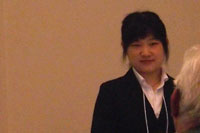Political Integration and Identity
Cultivating Talented Individuals:Support Scheme:Support Scheme for Presentation at International Conference, etc. (for student)
Zhou Ying / Monterey, California and Portland, Oregon, USA
2010.07.01
Affiliation: GSAPS
Name: Zhou Ying
Itinerary: 06/15/2010/ - 06/22/2010/(Month/Date/Year)
Name: Zhou Ying
Itinerary: 06/15/2010/ - 06/22/2010/(Month/Date/Year)
Destination (Name of city and country)
Monterey, California and Portland, Oregon, USA
Research objectives
It is my second year in GSAPS, I finished a paper about my research. Thus, it was worthwhile to present my work in international conference to get due response from other scholars or researchers in the same field. Therefore the objectives of this investigative research are as follows:
- To do the rehearsal presentation in Monterey with Professor Akaha who would be chairing the panel since this is the first time to do presentation at international conference outside of Japan.
- To present the research paper in the "44th annual conference of the Asian Studies on the Pacific Coast (ASPAC) 2010" at the Portland State University, Oregon, USA and to get the response on it.
- To make the research output more acceptable to international academic community by incorporating the comments and suggestion by the participants from different parts of the world.
- To do interviews with director and co-director of Confucius Institute at Portland State University and collect more empirical data of my PhD research. And to consult with some experts and scholars who are quit into China's issues or foreign policy as well as Asian issues in order to better off my PhD dissertation.
- It also intends to set up personal network with academicians around the world.
Research project
Title: China's Soft Power in its Foreign Policy in Asia: Ideas, Institutions, and Responsibilities
This paper applies Joseph Nye's analytical framework on soft power to look at the China case, in order to provide a more updated analysis of the country's power status in Asia. In Nye's work, soft power is composed of cultural attractiveness, political values, and foreign policy. Putting China's soft power in the ongoing Asian cooperation, this paper will mainly examine China's soft power thinking in its foreign policy. It will focus on the substance and style of China's foreign policy in Asia. In methodology, this paper draw from Chinese official government statements, journal articles in China and outside, media reportages, focused surveys and opinion polls, and consultations with some experts who are quit into China issues. This paper find that China's foreign policy in Asian since mid-1990s are featured with co-optive behavior which is traditional not in its foreign policy. But even China made a lot of efforts to tap its soft power; this paper finds that there is a huge gap between China's self-perception and Asian's perception towards its soft power.Achievement
The research project is successful to meet its objectives. The paper was presented in the "44th annual conference of the Asian Studies on the Pacific Coast (ASPAC) 2010" at the Portland State University, Oregon on 19th of June and got valuable comments and suggestions. Brief explanations of the achievement of this research project are as follows;

- We two panels did very valuable and successful rehearsal presentation at Monterey Institute of International Studies. Professor Akaha gave us very useful comments and suggestions on how to improve our PhD research. He also introduced a lot of valuable academic information about the US and the MIIS.
- The paper has been presented at the ASPAC conference and got valuable questions from the audience in the floor. They are very useful for better-off my research. It aroused interests towards China's soft power. In the panel chaired by Professor Tsuneo Akaha "Major Power in Regional Cooperation and Integration in the East Asia" in which I presented the paper was interesting as it attracted many participants. Each of us three PhD students got responses from the floor. After the presentation there was a lively question and answer session. Several professors and PhD students from various universities provided very useful and insightful comments and suggestions. These questions are encouraging for our research work.
- The conference covered most of the issues of Asia Pacific development covering social, cultural, political as well as economic aspects. I joined in some of them and learned a lot in Pacific issues.
- Also the interview I did there will be useful in my study on China's soft power. As far as I am concerned, it is a very encouraging research trip. I benefited a lot from the seven days in the US, in terms of obtaining comments and advise on my research work, and getting to know those nice professors there. I received a lot of assistances from some of them, especially professor Akaha when I was in Monterey, not only academically but also in terms of life. And I think the latter is much more significant to my life career. This research trip not only allowed me to learn the experiences of doing interviews but also helped me establish my academic social network with them.
- Finally, I earnestly say thanks to the GIARI for giving me the financial support generously and say thanks to my advisor Amako who gave me a lot of valuable guidance on my research.

Confirmed by person in charge of project promotion
Academic Adviser: Satoshi AMAKO
